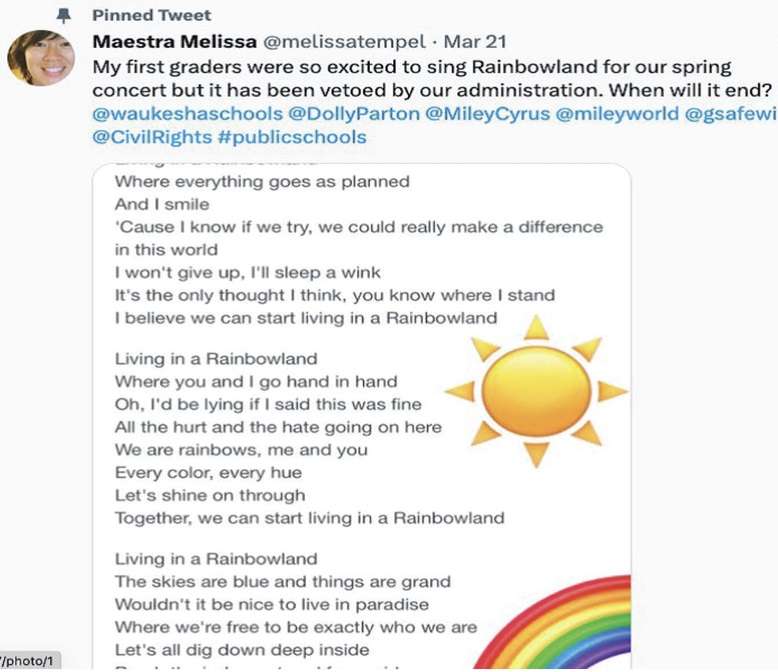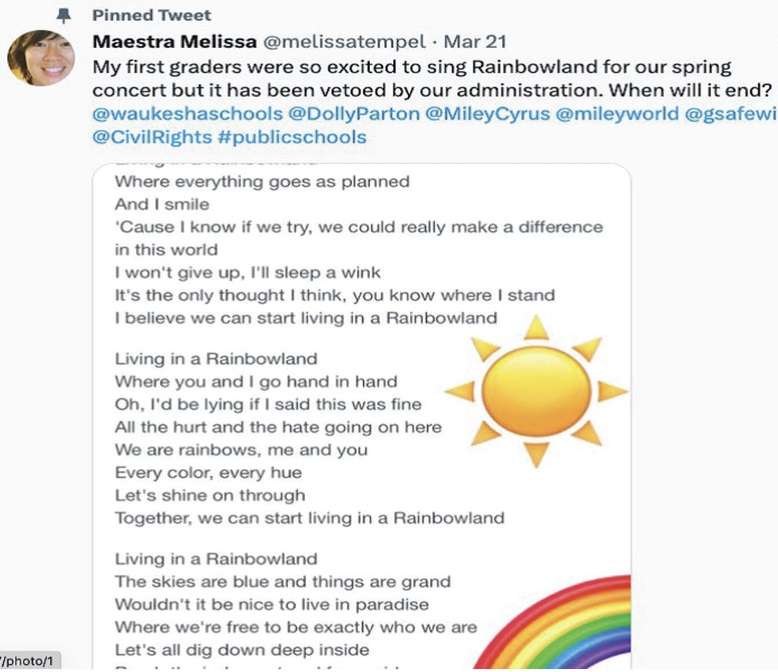School allowed to fire teacher whose criticism of school policy led to ‘disruptive’ criticism and insults from public

From Tempel v. from Waukeshadecided on September 29 by Magistrate Judge Nancy Joseph (ED Wis.):
Tempel was employed by the district as a first-grade bilingual teacher at Heyer from fall 2018 until her termination on July 12, 2023…. In 2021, several new members were elected to the district’s school board, prompting what many members of the Waukesha community perceived as a more conservative shift in perspective.
In July 2021, the district suspended diversity, equity, and inclusion training for staff and suspended the work of the district’s equity leadership team…. In August 2021, consistent with the Controversial Issues Policies, the Board adopted a policy to prohibit “controversial” signs in the classroom… (including) signs related to Black Lives Matter, Blue Lives Matter, Thin Blue Line, Anti-racist class, and other materials. The policy also bans all flags, including pride flags. The district’s decision regarding signage attracted attention from the community, parents, students, teachers, staff and media. (More details omitted. -EV) …
Each year, Heyer freshmen participate in a spring concert…. (One of the songs originally planned,) “Rainbowland” by Miley Cyrus and Dolly Parton… (reportedly rejected by principal) Schneider… (in favor of) “Rainbow Connection” by Kermit the Frog…. On March 21, 2023, at 6:39 p.m., Tempel posted the following tweet on its public Twitter account:
After this first tweet, Tempel tweeted several times and conducted media interviews about “Rainbowland”…. Following Tempel’s tweets, the District claims to have received numerous voicemails and emails containing “vulgar and threatening remarks”… (including):
1. “Hey, I heard your school district doesn’t like gays. Fuck you, you fucking retards! Kill yourselves!”
2. “Cultural ignorance based on religion – how stupid. You are stupid little pricks. Consider changing this or face the consequences”,
- “You’re a fucking asshole for working for that pig. Rot in hell!”
(More details omitted. -EV)
The court concluded that Tempel could be dismissed under what is known as Pickering balancing test, which allows public sector employers to fire employees when employee speech sufficiently harms workplace efficiency:
Below Pickeringthe onus is on the employer to demonstrate that its interest in workplace efficiency outweighs the employee’s right to speak….
Regarding potential security risks and disruptions, the filing states that shortly after Tempel’s tweet, Heyer’s office and the district’s main office received up to twenty calls per day regarding the “Rainbowland” decision, many of which consisted of shouting and insults from the caller. During spring break, Schneider received several emails from staff and parents expressing concerns about school security. So, the weekend before Heyer returned from spring break, Schneider sent an email to all of Heyer’s staff reassuring them that safety and security are their top priority and informing them that police would be outside the building upon arrival and dismissal and as needed throughout the day. And indeed, after spring break, police officers remained on duty at Heyer and the district office for several days.
Chaparro testified that Heyer typically receives about 40 calls a day. However, following Tempel’s tweets, she received 15 to 20 additional calls. And these additional calls were not easy to take: people were calling him to “express their opinions” and doing so in an abusive manner. Ettinger testified similarly, saying she was called “every name in the book,” as “homophobic,” during her 25 to 30 daily “Rainbowland”-related calls. Furthermore, even if the police were stationed outside the school “out of an abundance of caution,” that does not make their presence any less disconcerting for staff and students.
As for the disagreement within Heyer’s staff, Schneider testified that upon his return to the school after spring break, he observed an increased level of discord among his staff members, which was “significantly different” from anything the school had previously experienced. He testified that he received one to two staff complaints per day about a colleague’s behavior, prompting him to call a “student services meeting” to address “significant concerns among staff.” Schneider further testified that he observed distractions and “strong feelings” among staff that impacted their preparation time for classes.
Tempel argues that his speech did not cause disagreement among Heyer’s staff and that, to the extent there was disagreement, it predated his tweets. Although Schneider acknowledged that his staff did not always get along perfectly in the past, he testified that Heyer had never before experienced the level of staff discord that he observed following Tempel’s tweets. Again, the discord was so great that Schneider said he called a “student services meeting” that, for the first time, was intended to allow staff to express their concerns and feelings as staff members, as opposed to what the meetings were usually held for: meeting the needs of students.
The filing contains several emails from staff members sent to Schneider and Sebert during spring break, expressing concern about the school’s safety and the negative attention Tempel’s tweets could bring to the school. Thus, although no staff members expressed concerns, the record confirms the existence of discord and distraction among staff members following Tempel’s tweets.
Thus, while Tempel disputes the severity of the disruption, the Seventh Circuit held that school officials can act “to nip in the bud reasonable predictions of imminent disruption,” so long as those predictions are reasonable. And in this case, given the evidence of staff discord, it was not unreasonable for the district to act before the disruptions potentially got worse.
Additionally, Tempel’s method of speaking weighs even more in favor of the District. Although speech made outside the workplace may be less disruptive to the effective operation of the employer, as the Seventh Circuit noted, speech made on social media may carry a “clear risk of amplification” and therefore disruption.
While Tempel tweeted from a personal account outside of school hours and outside of school grounds, she identified herself as a first-year teacher and named her school and district during her tweets…. (When an audience member asked, “Are you a teacher in Waukesha” and “what school was supposed to sing (Rainbowland)?” Temple responded by stating “Heyer Elementary.” When asked how many students there were in his class, Tempel replied “24,” but that the school had about 65 first graders total.
Predictably, this drew widespread attention and criticism of the school. And her identification as a teacher at this school only increased the attention of the statements. There is no denying that Tempel’s tweet received national media coverage, with Tempel participating in interviews with local and national media discussing the “Rainbowland” decision. The court has “repeatedly recognized that public school teachers occupy a unique position of trust”; thus, employers have “more latitude to restrict the speech of a public-facing employee, such as a teacher, who must maintain public trust and respect to be effective.” …
The undisputed facts show that Tempel’s tweets caused substantial disruption to the school and district. Thus, in weighing the relevant factors for Pickering In balance, I find that the District’s interest in workplace efficiency outweighs Tempel’s First Amendment interest in expression.
Another reminder, I think, of how the government as an employer has, rightly or wrongly, great power to punish employees for their speech. Generally speaking, the government cannot prosecute or civilly fine a citizen because his or her speech provokes public anger – either at the speaker or at the people the speaker criticizes. But cases like this (applying the Supreme Court decision Pickering precedent) show that if enough people are upset by a government employee’s speech to the point of complaining enough to the employer to be “disruptive,” the employee can actually be fired.
Christina A. Katt, Hunter Michael Cone and Joel S. Aziere (Buelow Vetter Buikema Olson & Vliet LLC) represent the defendant.



